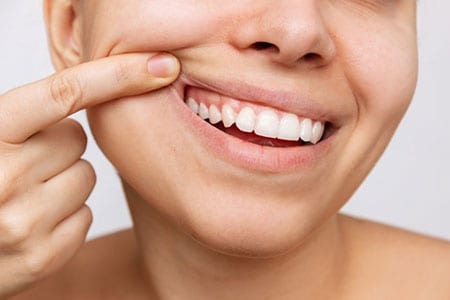Dental Crowns In Whitehouse, OH

Breaking or damaging a tooth affects both your appearance and your health. You may find yourself hiding your smile in public or in pictures. A chipped or fractured tooth also puts you at risk for a number of dental issues, including cavities, decay and even tooth loss.
At Dental Health Associates of Whitehouse, Dr. Huntzinger is committed to offering safe and effective dental solutions that help patients achieve both optimal oral health and a radiant smile. Crowns are dental restorations used to restore the health and look of natural teeth. Crafted from porcelain or ceramic composite, crowns are long-lasting and blend seamlessly into your smile.
Treatment Details
After two trips to our office, you can attain a crown that looks and feels natural. The first step is to take a series of X-rays and mouth impressions. These will be used by a dental laboratory to create your custom crown. Under local anesthetic, the target tooth will also be slightly re-contoured to allow for a secure bond with the crown, once it is ready.

Between appointments you will wear a temporary acrylic crown. When the laboratory has finished fabricating your permanent crown in two to three weeks, you will return to the office for the fitting. Your dentist will take the time to ensure you are happy with the feel and fit, and that the new crown does not interfere with your bite. It will be cemented into place, again using local anesthetic.
Uses for Dental Crown

Dental crowns are a versatile dental solution that a dentist may recommend in a variety of circumstances. Most often, they are used to bolster a natural tooth that has become weak from decay so that the tooth can continue biting at full strength. This is especially common following a root canal.
In restorative dentistry procedures, crowns are used to secure dental bridges to natural teeth. They also are used as the cap for dental implants.
Sometimes, dental crowns are purely cosmetic. They can cover a tooth that is cracked, chipped, mishappen, or discolored so that the tooth matches your other teeth more closely without needing to remove the irregular tooth altogether. A crown can be less expensive than a porcelain veneer for this purpose.
Recovery After Dental Crown
Although you may notice some slight discomfort, swelling, and tooth sensitivity after a crown appointment, you can resume most normal activities as soon as your appointment is complete. Pain medication can address the discomfort. Using a saltwater rinse and avoiding hot or cold foods can further help to limit the sensitivity you experience.
Frequently Asked Questions
Am I a candidate for a dental crown?
This dental restoration may be right for you if you have: • Chipped or fractured teeth
• Decayed or otherwise damaged teeth
• A weakened tooth following a root canal
• A dental implant (the crown is placed over the implant)
If decay or damage to the tooth is less severe, a regular dental filling may be more appropriate. Crowns are necessary whenever a root canal has been required. Crowns can play other useful roles, such as providing stability for dental bridges.
What are the benefits of a dental crown?
A crown can protect and even save your tooth, by adding stability to the tooth and capping it with a strong composite material that will prevent air or microbes from reaching the interior of the tooth. In addition to preserving a tooth, one benefit that patients especially appreciate is that when a major dental procedure such as root canal is finalized with a crown, the severe pain that was experienced is gone, and will not come back.
Crowns can last 15 years or more, and provide natural form and function. They blend in with the color and size of surrounding teeth, will not damage opposing teeth in the upper or lower mouth, and are as inconspicuous in your mouth as a regular filling.
What are my choices in dental crowns?
New technology has improved the stability and durability of crowns, and multiplied the choices for patients. The most popular option is the porcelain variety. Like your natural teeth, a porcelain crown has a translucent surface that helps it blend in well with adjacent teeth.
Additional strength is provided by porcelain-to-metal crowns, although the metallic element of this crown may be slightly visible at the gum line. Crowns that are 100 percent metal are even stronger; however, because they are very noticeable in the mouth, they are typically reserved for molars. Somewhat surprisingly, metal crowns put less stress on other teeth during chewing.
Many patients opt for ceramic crowns because of their lower cost. The savings are short-term, as ceramic crowns do not last as long as the porcelain variety. Ceramic crowns are especially popular for front teeth.
What happens if my crown comes loose?
Crowns are cemented to the top of your natural tooth and should remain secure for many years. However, it is not unusual for a crown to detach from your tooth, particularly if you are chewing on something hard or sticky. If your crown is still in good condition (not cracked or chipped), your dentist can usually easily reattach your crown with dental adhesive.
To learn more about dental crowns, please contact Dental Health Associates of Whitehouse today.


